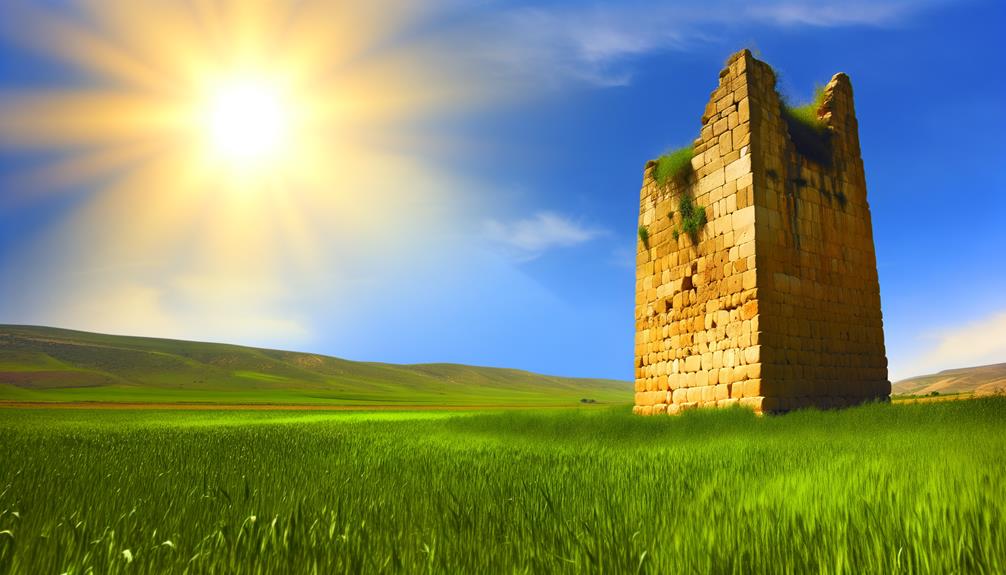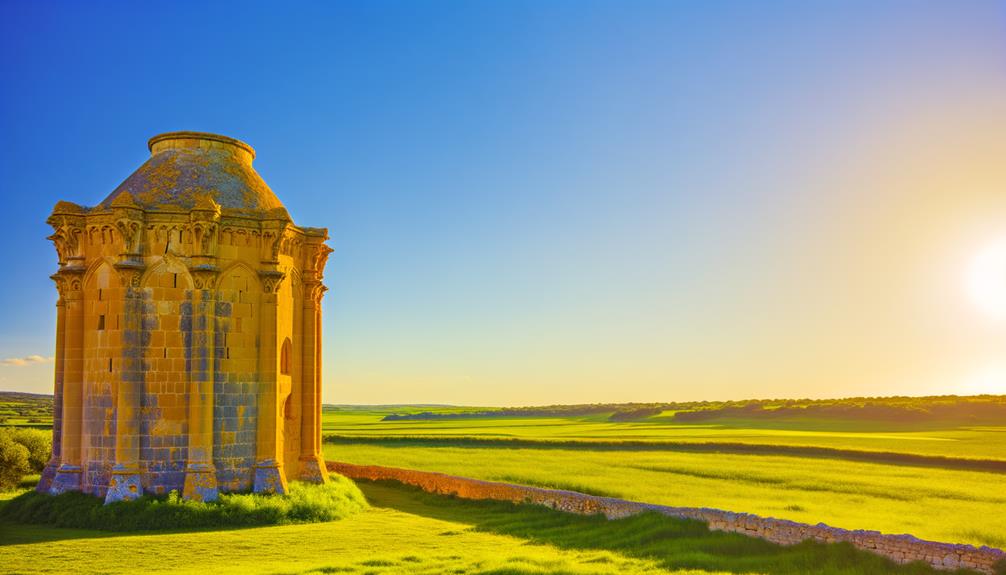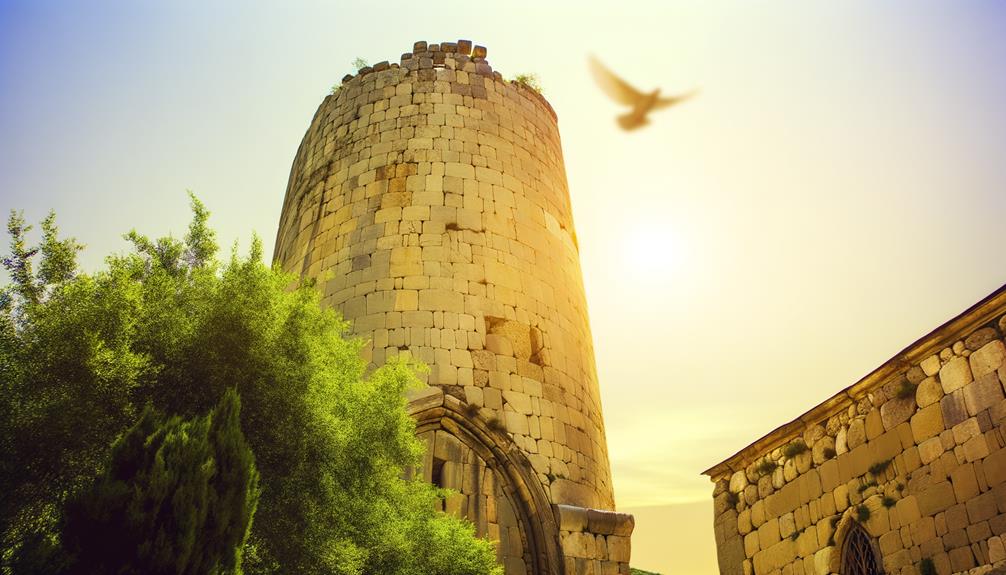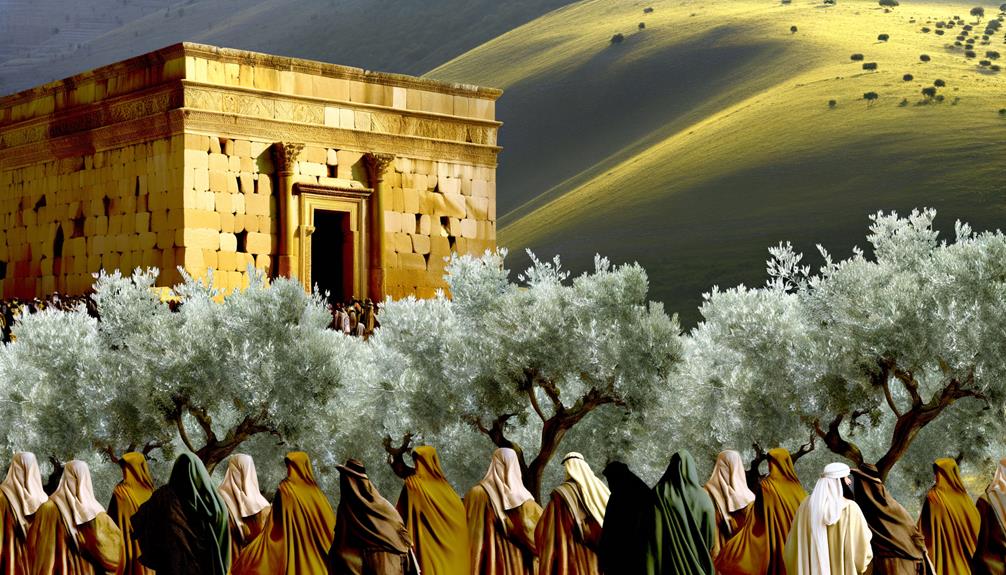High Tower Meaning In The Bible: Refuge and Strength
In the Bible, the term ‘high tower‘ symbolizes divine protection, strength, and refuge, underscoring God’s omnipotence and omnipresence. It serves as a metaphor for spiritual fortitude, with key verses such as Psalm 18:2 and Proverbs 18:10 highlighting God as a fortified stronghold offering safety and shelter.
High towers also critique human pride and false security, as seen in Isaiah 2:12-17, where human arrogance is contrasted with divine authority. This duality enriches the biblical narrative, offering layers of meaning that explore the relationship between divine providence and human endeavor.
Further insights into this symbolism await.

High Tower Meaning in the Bible: Symbol of God’s Protection and Strength
| Aspect | Biblical Insight |
|---|---|
| Symbolic Meaning | A place of refuge, safety, and divine protection. |
| Key Scripture | Proverbs 18:10 – “The name of the Lord is a strong tower; the righteous run into it and are safe.” |
| Spiritual Representation | God’s strength, reliability, and shelter during adversity. |
| Ancient Context | High towers were defensive structures providing visibility and protection. |
| Emotional Significance | Brings assurance, peace, and confidence in God’s presence. |
| Relation to Faith | Encourages trust in God as a secure and unshakable refuge. |
| Purpose in Scripture | To illustrate God’s role as a strong protector in the lives of believers. |
Symbolism of High Towers
Throughout the Bible, high towers frequently symbolize strength, protection, and divine refuge. This symbolism is rooted in the ancient Near Eastern context, where physical towers served as fortresses against enemies and natural disasters.
Biblically, high towers transcend their literal function, embodying the omnipotence and omnipresence of God. They represent a place of security and safety, metaphorically illustrating God’s protective nature.
Passages like Proverbs 18:10, which states, ‘The name of the Lord is a fortified tower; the righteous run to it and are safe,’ underscore this allegorical significance.
High towers in biblical literature consequently offer profound insight into the spiritual relationship between humanity and the divine, reinforcing themes of faith, reliance, and divine guardianship.
High Towers in Psalms

In the Psalms, high towers are often invoked as metaphors for divine protection and unwavering faith in God’s providence. These structures symbolize a place of safety and security amidst life’s adversities.
Several Psalms illustrate the role of high towers in expressing trust in divine safeguarding:
- Psalm 18:2: ‘The Lord is my rock, my fortress, and my deliverer; my God, my strength, in whom I will trust; my buckler, and the horn of my salvation, and my high tower.’
- Psalm 61:3: ‘For thou hast been a shelter for me, and a strong tower from the enemy.’
- Psalm 144:2: ‘My goodness, and my fortress; my high tower, and my deliverer.’
These verses underscore the theme of divine fortification and protection.
Refuge and Strength

Building upon the metaphor of high towers as symbols of divine protection in Psalms, the concepts of refuge and strength further underscore the Bible’s portrayal of God’s role as a steadfast protector and source of unwavering power.
The Hebrew term ‘ma’oz,’ often translated as refuge, conveys a sense of fortified shelter, emphasizing God’s ability to provide safety amidst turmoil.
Concurrently, the notion of strength, derived from the term ‘oz,’ highlights divine empowerment, enabling believers to endure adversity.
Psalm 46:1 succinctly encapsulates this dual assurance: ‘God is our refuge and strength, an ever-present help in trouble.’
Consequently, these intertwined themes of refuge and strength reinforce the theological assertion of God’s omnipotent guardianship and sustaining presence in the lives of the faithful.
Divine Protection

Divine protection, as illustrated through the metaphor of high towers, encapsulates the biblical theme of God’s unwavering defense against spiritual and physical adversities. This metaphor is rich in meaning, drawing on the imagery of ancient fortifications that were impenetrable and provided a vantage point over threats.
The high tower symbolizes:
- Sanctuary: A place of safety where believers find refuge from danger.
- Strength: An embodiment of divine power that surpasses human limitations.
- Watchfulness: A position from which God oversees and safeguards His people.
These attributes collectively underscore the thorough and steadfast nature of divine protection, assuring believers of God’s constant vigilance and support in times of peril.
God as a High Tower

In biblical literature, the metaphor of God as a high tower epitomizes the notions of divine protection, spiritual refuge, and unwavering strength.
This imagery underscores the theological belief that trust in God’s security provides believers with an impervious sanctuary amidst life’s adversities.
Such symbolism reinforces the covenantal relationship between humanity and the divine, emphasizing reliance on God as the ultimate bastion of safety and fortitude.
Biblical Symbol of Protection
The concept of God as a high tower in the Bible symbolizes an ultimate refuge and protection, offering believers a profound sense of security amidst life’s adversities. This metaphor is deeply rooted in biblical texts, portraying God as an unassailable fortress.
Key scriptural references underscore this imagery:
- Proverbs 18:10: ‘The name of the Lord is a strong tower; the righteous run to it and are safe.’
- Psalms 61:3: ‘For you have been my refuge, a strong tower against the foe.’
- 2 Samuel 22:3: ‘My God is my rock, in whom I take refuge, my shield and the horn of my salvation.’
These verses collectively emphasize God’s role as a steadfast protector.
Spiritual Refuge and Strength
Building upon the metaphor of God as a high tower, this concept extends beyond mere protection to embody a profound source of spiritual refuge and strength for believers.
In biblical literature, the high tower signifies not only a physical bastion but also a sanctuary where one finds divine solace and empowerment.
For instance, Psalms 18:2 declares, ‘The Lord is my rock, my fortress, and my deliverer; my God is my rock, in whom I take refuge.’ This verse elucidates how the high tower serves as a symbol of unwavering divine presence that fortifies the faithful amidst life’s adversities.
Hence, the high tower metaphorically nurtures inner fortitude and resilience, reinforcing believers’ spiritual foundation and alignment with divine will.
Trust in Divine Security
Trust in divine security, epitomized by the metaphor of God as a high tower, fundamentally underscores the theological conviction that faith in God’s protection engenders a profound sense of spiritual assurance and stability.
This metaphor, deeply rooted in biblical exegesis, conveys not only God’s omnipotence but also His unwavering presence in the believer’s life.
The high tower symbolizes:
- Impenetrable refuge: An unassailable sanctuary against spiritual and existential threats.
- Elevated perspective: A vantage point providing clarity and foresight.
- Dependable strength: An enduring source of fortitude amidst life’s adversities.
Through this metaphor, believers are invited to embrace a trust that transcends earthly uncertainties, finding solace in divine constancy and protection.
High Towers in Isaiah

In the Book of Isaiah, high towers often symbolize human pride and the false sense of security that comes from relying on physical structures rather than divine protection. Isaiah critiques the hubris of those who trust in their own creations, warning of inevitable downfall.
The imagery of high towers conveys a stark contrast between human arrogance and divine sovereignty. Isaiah 2:12-17 illustrates this theme effectively, highlighting the futility of such pride.
| Verse | Message |
|---|---|
| Isaiah 2:12 | Day of the Lord against all that is proud |
| Isaiah 2:13 | Against tall cedars and lofty oaks |
| Isaiah 2:14 | Against high mountains and hills |
| Isaiah 2:15 | Against every high tower |
| Isaiah 2:17 | Human pride humbled, the Lord exalted |
Through these verses, Isaiah underscores the transient nature of human achievements compared to God’s eternal authority.
Historical Context

The historical context of high towers in the Bible encompasses their construction in ancient civilizations, where they served both practical and symbolic purposes.
Scriptural references often imbue these structures with deeper meanings, reflecting themes of divine protection and human ambition.
An overview of their cultural significance reveals how high towers functioned as both architectural feats and spiritual metaphors within biblical narratives.
Ancient Tower Constructions
Although ancient tower constructions are often shrouded in myth and legend, archaeological evidence provides valuable insights into their historical context and architectural significance.
These structures, ranging from Mesopotamian ziggurats to Egyptian pyramids, reflect the technological prowess and sociopolitical dynamics of their time.
Key aspects of ancient tower constructions include:
- Functionality: Serving religious, defensive, and communal purposes.
- Materials: Utilizing locally sourced materials like mud bricks, limestone, and granite.
- Symbolism: Often representing divine connection or political power.
Analyzing these elements reveals how ancient civilizations used towers not merely as physical edifices but as embodiments of cultural and societal values.
Such constructions underscore the ingenuity and aspirations of early societies.
Symbolism in Scriptures
Scriptural symbolism, particularly concerning high towers, often reflects broader theological and cultural narratives central to biblical texts.
High towers in scriptures, such as the Tower of Babel in Genesis 11, symbolize human ambition and the desire to reach divine domains, often resulting in divine intervention and dispersion as a consequence of hubris.
In contrast, Proverbs 18:10 portrays a high tower as a metaphor for divine protection, stating, ‘The name of the Lord is a fortified tower; the righteous run to it and are safe.’
These symbolic uses of high towers underscore themes of human limitation, divine sovereignty, and the protective nature of God, providing insight into the values and beliefs of ancient Biblical communities.
Cultural Significance Overview
In examining the cultural significance of high towers within the historical context of biblical times, it becomes evident that these structures were not merely architectural feats but also symbolic representations of societal values, religious beliefs, and political power.
High towers served various purposes, including:
- Defense Mechanisms: Towers were integral to city fortifications, offering vantage points for surveillance and protection.
- Religious Symbols: They often represented humanity’s attempt to reach the divine, as seen in the Tower of Babel.
- Political Statements: Towers symbolized the might and authority of rulers who commissioned their construction.
Understanding these dimensions elucidates the multifaceted role of high towers in biblical narratives.
Interpretations by Scholars

Prominent biblical scholars have extensively analyzed the symbolism of ‘high towers‘ to uncover their multifaceted meanings within scriptural contexts. Scholars such as John Walton and Walter Brueggemann posit that high towers often symbolize divine protection and human arrogance.
In Psalms 18:2, the high tower represents God’s safeguarding presence, providing refuge and stability. Conversely, the Tower of Babel (Genesis 11:1-9) exemplifies human hubris and the resulting divine disapproval.
Additionally, scholars highlight the role of high towers in ancient Near Eastern military architecture, symbolizing strength and defense. Consequently, the dual symbolism—protection under divine care and the perils of human pride—offers a nuanced understanding, reflecting the cultural and theological dimensions embedded within biblical narratives.
High Towers in Prophecy

High towers in biblical prophecies often serve as potent symbols of divine protection and human hubris.
These structures are imbued with spiritual significance, representing both the strength of faith and the potential downfall linked to pride and defiance.
Analyzing their appearances in prophetic texts can reveal deeper theological and moral lessons pertinent to the overarching biblical narrative.
Symbolism in Biblical Prophecies
Examining the role of high towers within biblical prophecies reveals a complex interplay of symbolism that often signifies divine judgment, human pride, and the aspiration to reach the heavens.
Prophets frequently use high towers to metaphorically convey themes of:
- Divine Judgment: Towers are toppled as a sign of God’s retribution against nations or individuals.
- Human Pride: Towers symbolize human arrogance, as seen in the Tower of Babel narrative.
- Aspiration: High towers represent humanity’s desire to reach divine territories, often leading to moral downfall.
This multifaceted symbolism underscores the profound spiritual and moral lessons embedded within biblical prophecies.
High Towers’ Spiritual Significance
In biblical prophecy, high towers serve as profound symbols reflecting the intricate relationship between divine authority and human ambition. These towering structures often signify human pride and the desire to reach the heavens, contrasting with the humility expected by divine decree.
The Tower of Babel exemplifies this tension, illustrating the consequences of human overreach. Conversely, high towers can also represent divine protection and refuge, as seen in Proverbs 18:10, where the “name of the Lord” is described as a “strong tower.”
| Symbol | Interpretation |
|---|---|
| Tower of Babel | Human pride and ambition |
| Divine Tower | Protection and refuge |
| High Places | Sites of worship and idolatry |
Understanding these symbols provides insight into the broader narrative of human aspiration versus divine will.
Relevance to Modern Believers

The metaphor of a high tower in the Bible, symbolizing divine protection and refuge, holds profound implications for modern believers maneuvering contemporary challenges. In today’s fast-paced world, the concept offers a timeless source of spiritual solace and strength. It encourages believers to seek God’s presence as a stabilizing force amidst life’s uncertainties.
- Emotional Stability: Provides a sense of peace in stressful situations.
- Spiritual Resilience: Reinforces faith during trials and tribulations.
- Guidance: Offers divine wisdom to navigate moral and ethical dilemmas.
Understanding this metaphor can help modern believers integrate these spiritual principles into their daily lives, thereby enhancing their overall well-being and faith journey.
Conclusion
The symbolism of high towers in the Bible juxtaposes human frailty with divine strength, offering a refuge and fortress in times of peril.
Psalms frequently illustrate God as a high tower, providing solace and protection.
Historical contexts and scholarly interpretations further elucidate this metaphor’s depth, revealing layers of divine assurance.
High towers in prophecy underscore their enduring significance.
For modern believers, these ancient symbols continue to resonate, offering spiritual fortitude amidst contemporary challenges.






